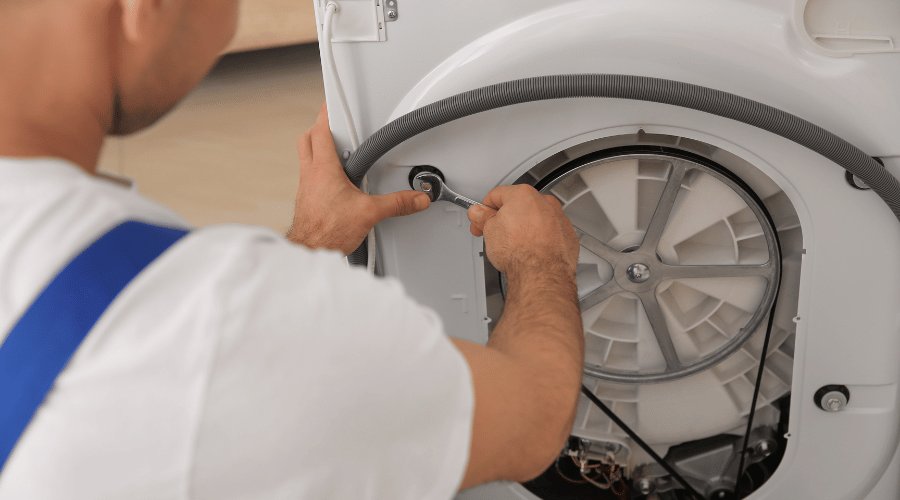Solutions for a Leaking Washing Machine and Prevention Tips
A leaking washing machine can lead to various problems, including water damage and costly repairs. It’s important to address leaks promptly to avoid further complications. In this blog post, we will explore the common causes of washing machine leaks, provide practical solutions for fixing them, and offer prevention tips to keep your washing machine leak-free.
Common Causes of Washing Machine Leaks
Worn or damaged hoses
Washing machine hoses can deteriorate over time, leading to leaks. Look out for signs such as cracks, bulges, or visible water leaks near the hose connections. To fix this issue:
– Turn off the water supply and unplug the machine.
– Disconnect the old hose from the machine and the water supply.
– Install a new hose tightly and securely.
Faulty water inlet valve
A malfunctioning water inlet valve can result in leaks during the fill cycle or water continuously flowing into the machine. Here’s what you can do
– Check for any signs of leaks around the water inlet valve.
– Try cleaning the valve with a mixture of vinegar and water to remove any debris or mineral buildup.
– If cleaning doesn’t solve the issue, consider replacing the faulty valve.
Loose or damaged pump
A loose or damaged pump can cause leaks from the bottom of the machine or produce unusual noises during operation. Follow these steps
– Check the pump for any visible signs of damage or loose connections.
– Tighten any loose connections, ensuring they are secure.
– If the pump is damaged, it may need to be replaced. Consult a professional if necessary.
Overloading the machine
Overloading the washing machine puts excessive strain on its components and can lead to leaks.
– Follow the load size guidelines provided by the manufacturer.
– Distribute your laundry evenly in the drum to maintain balance during the spin cycle.
Solutions for a Leaking Washing Machine
Inspecting and tightening connections
Loose connections can contribute to leaks. Perform the following steps:
– Examine all the connections, including hoses, water supply lines, and drain pipes.
– Tighten any loose connections using pliers or an adjustable wrench. Be careful not to overtighten, as it may damage the fittings.
Checking and cleaning the detergent dispenser
Accumulated residue and clogs in the detergent dispenser can cause leaks. Take these measures:
– Remove the detergent dispenser from the machine.
– Soak it in warm soapy water and scrub away any residue or buildup.
– Rinse it thoroughly before placing it back into the machine.
Regular maintenance of the machine
Routine maintenance helps prevent leaks and ensures the machine’s longevity. Consider the following tasks:
– Clean the filter regularly to remove lint and debris.
– Check the drum for any foreign objects or buildup and remove them.
– Inspect the rubber seals around the door for any signs of wear or damage.
Seeking professional help
If the leaks persist or if you’re unsure about performing repairs yourself, it’s advisable to seek professional assistance. A qualified technician can diagnose the issue accurately and provide the necessary solutions.
Prevention Tips to Avoid Washing Machine Leaks
Proper installation
Follow the manufacturer’s instructions during installation to avoid future problems
– Ensure the machine is leveled properly to prevent excessive vibrations.
– Use the correct type of hoses and fittings for the water connections.
Regular inspection of hoses
Check the hoses periodically to identify any signs of wear and tear:
– Look for cracks, bulges, or leaks.
– Replace hoses every few years or as recommended by the manufacturer.
Avoiding overloading
Overloading the machine strains its components and can result in leaks.Here’s how to prevent it
– Adhere to the recommended load size for your machine.
– Distribute the laundry evenly in the drum to maintain balance.
Using appropriate detergent
Choosing the right detergent and using the correct amount is essential:
– Select a detergent suitable for your washing machine and water type.
– Avoid using excessive amounts of detergent, as it can create excess suds and lead to leaks.
Conclusion
Dealing with a leaking washing machine promptly can save you from potential water damage and costly repairs. By understanding the common causes of leaks, implementing the provided solutions, and following prevention tips, you can maintain a leak-free washing machine. Remember to perform regular maintenance tasks and seek professional assistance when needed to ensure the optimal performance and longevity of your machine.
FAQS
-
What are the common causes of a leaking washing machine?
Common causes include worn or damaged hoses, a faulty water inlet valve, a loose or damaged pump, and overloading the machine.
-
How can I fix a leaking hose?
Turn off the water supply and replace the worn or damaged hose with a new one.
-
What should I do if the water inlet valve is malfunctioning?
Try cleaning the valve to remove any debris or mineral buildup. If the issue persists, consider replacing the faulty valve.
-
How can I address a loose or damaged pump?
Check for loose connections and tighten them securely. If the pump is damaged, consult a professional for repair or replacement.
-
How does overloading contribute to washing machine leaks?
Overloading puts excessive strain on the machine’s components, potentially causing leaks. Follow load size guidelines and distribute laundry evenly.
-
What steps can I take to prevent leaks in my washing machine?
Proper installation, regular inspection of hoses, avoiding overloading, and using appropriate detergent are key prevention measures.
-
How can I tighten loose connections in my washing machine?
Identify loose connections around hoses, water supply lines, or drain pipes, and use pliers or an adjustable wrench to tighten them.
-
What should I do to clean the detergent dispenser?
Remove the dispenser, soak it in warm soapy water, scrub away residue, and rinse it thoroughly before placing it back in the machine.
-
Why is regular maintenance important for preventing leaks?
Regular maintenance tasks such as cleaning the filter, checking the drum, and inspecting rubber seals help keep the machine in good condition and prevent leaks.
-
When should I seek professional help for a leaking washing machine?
If the leaks persist or if you are unsure about performing repairs yourself, it’s advisable to seek professional assistance for accurate diagnosis and solutions.

